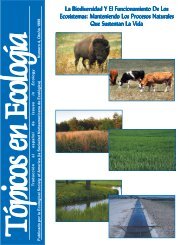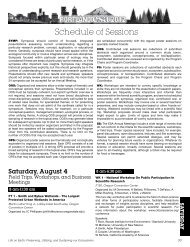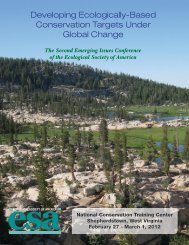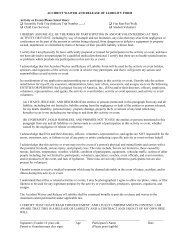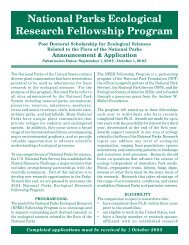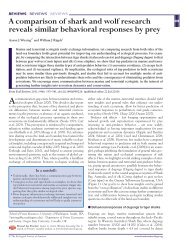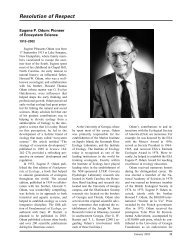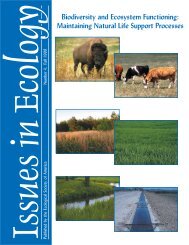Printed Program (PDF) - Ecological Society of America
Printed Program (PDF) - Ecological Society of America
Printed Program (PDF) - Ecological Society of America
Create successful ePaper yourself
Turn your PDF publications into a flip-book with our unique Google optimized e-Paper software.
THURSDAY<br />
1:30 pm-5 pm<br />
<strong>Program</strong>, (2)University <strong>of</strong> Alaska Fairbanks, (3)US<br />
Geological Survey, (4)Cary Institute <strong>of</strong> Ecosystem Studies,<br />
(5)US Geological Survey and University <strong>of</strong> Missouri, (6)<br />
National Wildlife Federation. Current and future impacts<br />
<strong>of</strong> climate and global change on biodiversity and the<br />
structure and functioning <strong>of</strong> ecosystems.<br />
2:10 PM SYMP 19-3 Davidson, EA, The Woods Hole Research<br />
Center, Massachusetts. The role <strong>of</strong> nitrogen in climate<br />
change and the impacts <strong>of</strong> nitrogen-climate interactions<br />
on terrestrial and aquatic ecosystems, agriculture, and<br />
human health in the United States.<br />
2:30 PM SYMP 19-4 Peterson, DL 1 , JM Vose 2 and T Patel-<br />
Weynand 3 , (1)US Forest Service, Pacific Northwest<br />
Research Station, (2)Southern Research Station, (3)<br />
National Research and Development Office. Effects <strong>of</strong><br />
climatic variability and change on forest ecosystems.<br />
2:50 PM SYMP 19-5 Walthall, C 1 , J Hatfield 1 , L Lengnick 2 ,<br />
E Marshall 3 , P Backlund 4 and MK Walsh 5 , (1)USDA<br />
Agricultural Research Service, (2)Warren Wilson College<br />
and USDA Agricultural Research Service ONP, (3)USDA<br />
Economic Research Service, (4)NCAR, (5)US Department <strong>of</strong><br />
Agriculture. Climate change impacts on agricultural systems.<br />
3:10 PM Break<br />
3:20 PM SYMP 19-6 Hall, JA 1 and M Blair 2 , (1)Department <strong>of</strong><br />
Defense: SERDP/ESTCP, (2)<strong>America</strong>n Cancer <strong>Society</strong>.<br />
Establishing a sustained assessment process.<br />
3:40 PM SYMP 19-7 Janetos, A 1 , MA Kenney 2 , R Chen 3 and<br />
D Arndt 4 , (1)PNNL/UMD, (2)National Oceanic and<br />
Atmospheric Administration and the U.S. Global Change<br />
Research <strong>Program</strong>, (3)Columbia University and NASA<br />
Socioeconomic Data Center, (4)National Oceanic and<br />
Atmospheric Administration. Developing a system <strong>of</strong><br />
National Climate Assessment indicators to track climate<br />
change impacts, vulnerabilities, and preparedness.<br />
4:00 PM SYMP 19-8 Staudt, A 1 , P Kareiva 2 , M Ruckelshaus 3 and<br />
B Stein 1 , (1)National Wildlife Federation, (2)The Nature<br />
Conservancy, (3)NatureCapital Project. Climate change<br />
and the interface <strong>of</strong> human and ecological systems: Recent<br />
advances in ecosystem services and climate adaptation.<br />
4:20 PM SYMP 19-9 Cloyd, ET, US Global Change Research<br />
<strong>Program</strong>. A moderated discussion on the National<br />
Climate Assessment.<br />
heterogeneity generated by plant-soil feedbacks has<br />
implications for species coexistence.<br />
2:30 PM SYMP 20-4 Bezemer, TM 1 , O Kostenko 2 and TFJ<br />
Van de Voorde 3 , (1)Netherlands Institute <strong>of</strong> Ecology<br />
(NIOO-KNAW), (2)Netherlands Institute <strong>of</strong> Ecology,<br />
(3)Wageningen University. Plant-soil feedback in<br />
belowground-aboveground interactions.<br />
2:50 PM SYMP 20-5 Kardol, P 1 , GB De Deyn 2 , CV Hawkes 3 , E<br />
Laliberté 4 and P Mariotte 5 , (1)Swedish University <strong>of</strong><br />
Agricultural Sciences, (2)Wageningen University, (3)<br />
University <strong>of</strong> Texas at Austin, (4)The University <strong>of</strong> Western<br />
Australia, (5)Ecole Polytechnique Fédérale de Lausanne<br />
& Federal Research Institute WSL. Plant-soil feedbacks<br />
in a temporally and spatially variable environment.<br />
3:10 PM Break<br />
3:20 PM SYMP 20-6 Schweitzer, JA 1 , TFJ van de Voorde 2 , K Clay 3<br />
and JK Bailey 1 , (1)University <strong>of</strong> Tennessee, Knoxville,<br />
(2)Netherlands Institute for Ecology - Wageningen<br />
University, (3)Indiana University. Evolutionary<br />
consequences <strong>of</strong> plant-soil feedback.<br />
3:40 PM SYMP 20-7 Bardgett, R 1 , FT de Vries 1 , E Morrien 2 and<br />
P Manning 3 , (1)Lancaster University, (2)2Netherlands<br />
Institute for Ecology, (3)Newcastle UNiversity. Plant-soil<br />
feedback and climate change: Plant and soil communities<br />
modify ecosystem responses to climate change.<br />
4:00 PM SYMP 20-8 Bever, JD 1 , T Fukami 2 , MB Eppinga 3 and<br />
KML Mack 1 , (1)Indiana University, (2)Stanford University,<br />
(3)Utrecht University. Plant-soil feedback: Conceptual<br />
integration and theoretical insights.<br />
4:20 PM SYMP 20-9 Fukami, T and M Nakajima, Stanford<br />
University. Plant-soil feedback, transient community<br />
dynamics, and plant species diversity.<br />
4:40 PM SYMP 20-10 Suding, KN 1 , A Kulmatiski 2 , AS<br />
MacDougall 3 , T Fukami 4 and WH van der Putten 5 ,<br />
(1)University <strong>of</strong> California at Berkeley, (2)Utah State<br />
University, (3)University <strong>of</strong> Guelph, (4)Stanford University,<br />
(5)Netherlands Institute <strong>of</strong> Ecology. Plant-soil feedback,<br />
invasion, and consequences for community assembly<br />
dynamics.<br />
SYMP 20 - Plant-Soil Feedback: The Past, the Present<br />
and the Future<br />
Portland Blrm 252, Oregon Convention Center<br />
Organized by: W Van der Putten, J Schweitzer, TM Bezemer, T<br />
Fukami<br />
Endorsed by: Soil Ecology Section<br />
Moderator: TFJ van de Voorde<br />
This symposium will provide a synthetic overview <strong>of</strong> historical<br />
perspectives, current knowledge and future research directions on<br />
the causes and consequences <strong>of</strong> plant-soil feedback, the reciprocal<br />
influences between plants and the biotic and abioic properties<br />
<strong>of</strong> soil, by integrating multiple scales, approaches, and levels <strong>of</strong><br />
ecological organization.<br />
1:30 PM SYMP 20-1 Van der Putten, W, Netherlands Institute <strong>of</strong><br />
Ecology. Plant-soil feedback: The past, the present and<br />
future challenges.<br />
1:50 PM<br />
2:10 PM<br />
150<br />
SYMP 20-2 Reinhart, KO, US Department <strong>of</strong> Agriculture,<br />
Agricultural Research Service. Plant-soil feedbacks and<br />
plant community composition in semiarid grasslands.<br />
SYMP 20-3 Brandt, AJ<br />
ESA 97th Annual Meeting, August 5 - 10, 2012, Oregon Convention Center<br />
1 , H de Kroon2 , HL Reynolds3 and JH Burns1 SYMP 21 - Mechanisms Leading to Drought Mortality:<br />
Links Between Hydraulic Failure, Carbon Starvation<br />
and Biotic Causes In Experiments, Observational and<br />
Modelling Studies<br />
Portland Blrm 253, Oregon Convention Center<br />
Organized by: M Zeppel (Melzeppel@gmail.com), S Sevanto, W<br />
Anderegg<br />
Endorsed by: Physiological Ecology<br />
Moderator: JD Lewis<br />
Current evidence, hypotheses and models <strong>of</strong> mechanisms leading<br />
to drought mortality, based on plant functional types from across<br />
ecosystems will be presented. Experiments and observational<br />
studies <strong>of</strong> conifers and angiosperms allow a synthesis <strong>of</strong> mechanisms<br />
leading to drought mortality, and linkages between hydraulic failure,<br />
carbon starvation and pest and diseases.<br />
1:30 PM Welcoming remarks<br />
1:35 PM SYMP 21-1 McDowell, N, Los Alamos National<br />
Laboratory. Some outstanding questions regarding<br />
mechanisms <strong>of</strong> drought-related vegetation mortality.<br />
1:55 PM SYMP 21-2 Sala, A, The University <strong>of</strong> Montana. Tree<br />
carbon reserves and survival to drought: Important<br />
knowledge gaps.<br />
2:15 PM SYMP 21-3 Anderegg, W, Stanford University. Droughts<br />
, (1)Case Western Reserve University, (2)<br />
legacy: Hydraulic deterioration underlies widespread<br />
Radboud University Nijmegen, (3)Indiana University. Soil<br />
aspen forest die-<strong>of</strong>f and portends increased future risk.



